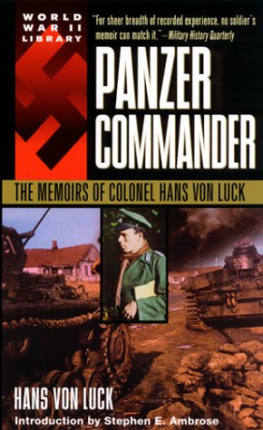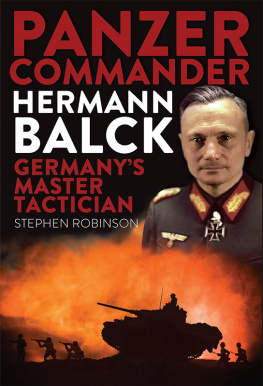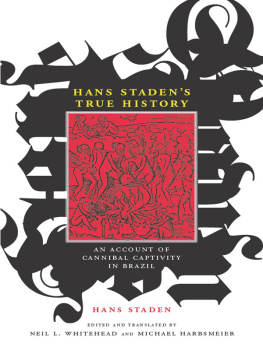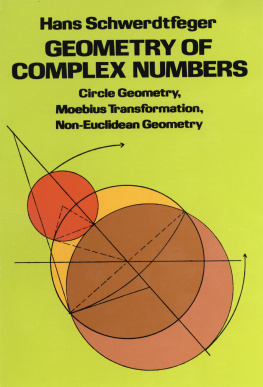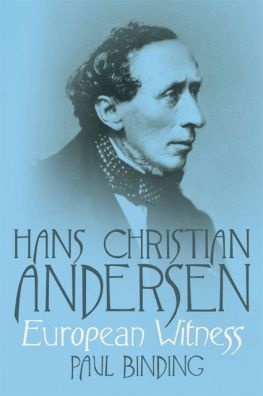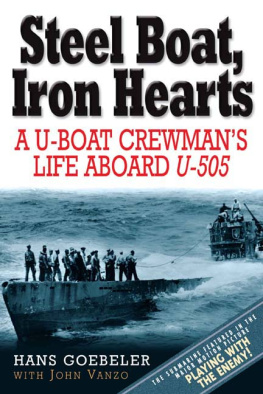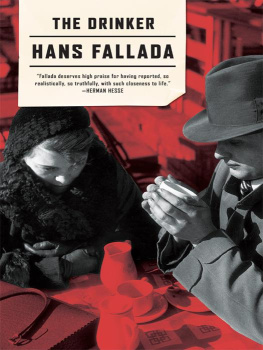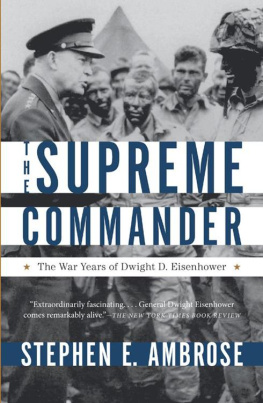Hans von Luck - Panzer commander : the memoirs of Colonel Hans von Luck
Here you can read online Hans von Luck - Panzer commander : the memoirs of Colonel Hans von Luck full text of the book (entire story) in english for free. Download pdf and epub, get meaning, cover and reviews about this ebook. City: New York, year: 1989, publisher: Praeger, genre: Non-fiction / History. Description of the work, (preface) as well as reviews are available. Best literature library LitArk.com created for fans of good reading and offers a wide selection of genres:
Romance novel
Science fiction
Adventure
Detective
Science
History
Home and family
Prose
Art
Politics
Computer
Non-fiction
Religion
Business
Children
Humor
Choose a favorite category and find really read worthwhile books. Enjoy immersion in the world of imagination, feel the emotions of the characters or learn something new for yourself, make an fascinating discovery.
- Book:Panzer commander : the memoirs of Colonel Hans von Luck
- Author:
- Publisher:Praeger
- Genre:
- Year:1989
- City:New York
- Rating:5 / 5
- Favourites:Add to favourites
- Your mark:
- 100
- 1
- 2
- 3
- 4
- 5
Panzer commander : the memoirs of Colonel Hans von Luck: summary, description and annotation
We offer to read an annotation, description, summary or preface (depends on what the author of the book "Panzer commander : the memoirs of Colonel Hans von Luck" wrote himself). If you haven't found the necessary information about the book — write in the comments, we will try to find it.
Panzer commander : the memoirs of Colonel Hans von Luck — read online for free the complete book (whole text) full work
Below is the text of the book, divided by pages. System saving the place of the last page read, allows you to conveniently read the book "Panzer commander : the memoirs of Colonel Hans von Luck" online for free, without having to search again every time where you left off. Put a bookmark, and you can go to the page where you finished reading at any time.
Font size:
Interval:
Bookmark:

Hans Von Luck - Panzer Commander
The Memoirs of Colonel Hans von Luck
TABLE OF CONTENTS
1. Growing Up, 1911-1929
2. The Reichswehr and My Teacher, Rommel
3. The Buildup of the Wehrmacht, 1934- 1939
4. Europe on the Eve of War: Travels and Experiences
5. Blitzkrieg: Poland, 1939
6. Interim, 1939-1940
7. France, 1940
8. Interim, 1940-1941
9. The Russian Campaign, June 1941 to January 1942
10. Interim, 1942
11. North Africa, 1942: Rommel, the Desert Fox
12. The Retreat from El Alamein
13. The End in North Africa, 1943
14. Berlin and Paris, 1943-1944
15. The Start of the Invasion, 6 June 1944
16. Operation Goodwood, 18/19 July 1944
17. Retreat to Germany, August-November 1944
18. Fighting the Americans, December 1944
19. The Eastern Front: The Last Battle
20. The 21st Panzer Division as Fire Brigade: The Beginning of the End
21. The End
22. Capture and Deportation
23. In the Coal Mines of the Caucasus Mountains
24. Kultura and Corruption: The Russian Mentality
25. Punishment Camp: Hunger Strike and the KGB
26. Release
27. A New Start
Although names, places, and dates have been carefully checked, this book makes no claim to be history. My memoirs reproduce, rather, the events and experiences that a young German had to go through in a period that changed Europe and almost the whole world.
The Second World War stands in the center. It shows, along with the preceding years, how intolerance, a false ideology, and propaganda can mobilize whole peoples against each other and plunge them into misery.
I dedicated my book to my three sons, born between 1954 and 1970, because I wish to address those generations that were born only during or after the war. My son Sascha, the youngest, asked me the other day: What doesNazi' actually mean? Why was Hitler 'bad'? Why did a whole people 'follow' him?" He and his generation must be given answers. Many teachers, even those born only during or after the war, have no answer, or only an inadequate one. Older people, for one reason or another, repress the period.
In countless conversations with the young of Germany, Great Britain, and France, at numerous lectures to young students at American universities, I have found that young people want to clear their minds about a period for which the information they are given is either nonexistent, insufficient, or one-sided.
Thus I firmly resist, for instance, classifying the Russians as bad and us in the West as good. That is too simple!
The reader will learn that the Russians too love their homeland, as we love ours. That during the war Russian mothers and wives had the same worries as ours. Today young people of the world, and precisely those of former adversaries in the war, understand each other with no problems. I hope that glasnost and perestroika will make it possible for the youth of the Soviet Union and other East European countries to be given the chance to join hands with young people in the West.
Those of my readers who have had the opportunity to visit the USSR, as athletes, scientists, or tourists, will have discovered that the Russian people are charming, hospitable, and ready to live at peace with all the peoples of our world.
Those who have never been to Russia ought to make good the omission.
I have tried to draw experiences from hundreds of episodes, pleasant and sad; experiences that may help to make it impossible for the events in Germany before and during the war ever to be repeated, anywhere. It is profoundly depressing to discover that since the end of the Second World War more than 150 wars have been, and still are being waged worldwide, whether on grounds of politics, economics, or ideology. It depresses me that only the presence of nuclear weapons, it seems, is capable of preventing a new passage of arms between two power blocs.
The example that young people set us older ones should be followed by all in positions of responsibility: the practice of tolerance, that best of human attributes. All of us should know that one can learn from bad experiences.
I thank all who have helped me to write this book. Without my friend Professor Stephen Ambrose of the University of New Orleans, it would never have been written. He forced me to relate my experiences, and constantly gave me the heart to continue.
I thank Major John Howard, my British adversary on D-Day, who as the hero of Pegasus Bridge has passed into war history and is today my friend. John tells anyone who asks him: If you want to know what it was like 'on the other side of the hill, ask my friend Hans." I thank Werner Kortenhaus, who is writing the history of the 21 st Panzer Division, for the extensive material which he put at my disposal.
My thanks are due to all my fellow prisoners, who shared with me the hard fate of five years of Russian captivity and who are still in touch today through the Camp 518 Association. Many refreshed my memory or, by describing their own experiences, helped to give the reader a graphic idea of our gulag life.
All, whether it be my adjutant Helmut Liebeskind, or my orderly and friend Erich Beck, or the many who fought with me on every front for nearly five years, have helped me and are a constituent part of the book.
My particular thanks are due to George Unwin of Surrey, England.
Of much the same age as me, George has translated my manuscript into English with fellow feeling, identifying himself with me.
My American and British friends who have read his text say without exception, We can literally hear Hans speaking and understand what he has to say to us. Last but not least I thank my wife, Regina, for her patience and collaboration. For nearly four years she has allowed me to work on my manuscript, assisted me in my research, and in her spare time made copies of hundreds of pages.
I am deeply moved by the Introduction which Steve Ambrose has written for this book. He has made my experiences his own. I am proud to be permitted to call this remarkable human being, author, and h istorian my friend.
I first met Hans von Luck in November 1983, in Hamburg. I was there to interview him on his role in the fighting on D-Day. My subject was the action at Pegasus Bridge, over the Caen Canal, which he had defended against a glider-borne attack by British airborne troops. He came to my hotel room, arriving precisely at the stroke of four P.m., as agreed.
The immediate impression was of a thin, wiry, strong man of medium height and, despite his white hair, of medium age. But a closer study of his ruddy, weathered face, deeply lined with wrinkles, revealed a man well into old age (he was in fact 72 years old). He had sharp features, a hawklike nose, deep-set penetrating eyes, a jutting chin, a large broad forehead, high cheekbones, and big jutting ears. Although he was dressed in a business suit, it took only the slightest imagination to see him in his desert uniform, buttoned to the high stiff collar, his Knight's Cross around his neck, a German officer's hat set back on his head, his goggles in place, the dust of North Africa covering him.
We ordered coffee from room service as he spread out his maps of Normandy. His English was accented but perfectly understandable. His manners, and his mannerisms, were those of an Old World aristocrat. He chain-smoked Marlboro Lights. He was eager to tell me of his experiences in Normandy, enthusiastic about my project.
We talked for four hours, with scarcely a pause. I got the details of his actions on the night of 5/6 June 1944, and an outline of his service elsewhere. As a military historian, I was of course fascinated to hear the war stories of the man who led the way into Poland in 1939, who was at the vanguard of Rommel's thrust to the Channel Coast in June 1940, who actually reached the outskirts of Moscow in November 1941, who supervised Rommel's extreme right flank in North Africa in 1942-43, and who commmanded the armored regiment that met the first D-Day attack in 1944. His stories of life in a POW camp in the Soviet Union, 1945-50, were gripping and revealing. His frequent expression of his great love for the Russian people, and his sympathy for their plight, was quite genuine, and surprising.
Font size:
Interval:
Bookmark:
Similar books «Panzer commander : the memoirs of Colonel Hans von Luck»
Look at similar books to Panzer commander : the memoirs of Colonel Hans von Luck. We have selected literature similar in name and meaning in the hope of providing readers with more options to find new, interesting, not yet read works.
Discussion, reviews of the book Panzer commander : the memoirs of Colonel Hans von Luck and just readers' own opinions. Leave your comments, write what you think about the work, its meaning or the main characters. Specify what exactly you liked and what you didn't like, and why you think so.

